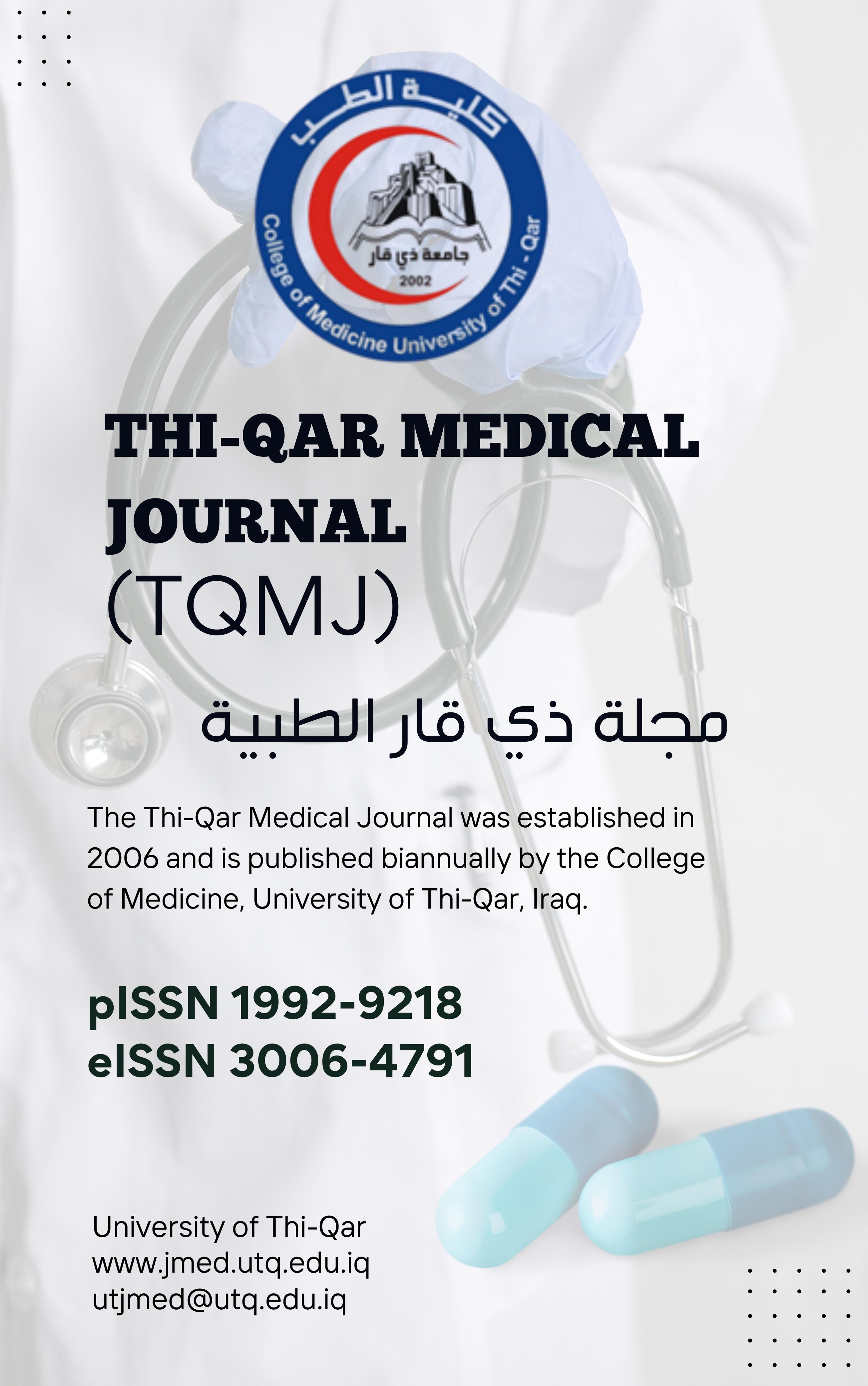Sampling Survey of Studying Knowledge, and Attitudes for Cholera Disease in Suq-Al-Sheeuq Residents
DOI:
https://doi.org/10.32792/tmj.v14i2.35Keywords:
Cholera Disease, Knowledge & Attitudes concerning Cholera Disease, Environment Information concerning Cholera Disease, Sources of water and Cholera disease, Methods of waste disposal and Cholera diseaseAbstract
Aims: This study aimed to identify level of knowledge, and attitudes concerning Cholera disease among population of Suq-Al-Sheeuq residents, and to find out association between an overall assessment concerning knowledge & attitudes in light of studies related of socio-demographic characteristics variables, as well as some of general information variables.
Methods: A convenient cross sectional design of sample size (110) persons were selected from Suq-Al-Sheeuq residents, during the period from 1/10/2015 to 1/11/2015,majority of collected samples were from male, and they are accounted 80(72.7%). The results of the review of the questionnaire by the experts revealed that all of the experts agreed that (60) items of the questionnaire distributed by different main domains, such that knowledge, and attitudes contents (51), and (9) items respectively, which were clear and adequate for the measurement of this study, pilot study of (10) persons proved high levels of reliability of inter and intra examiners, as well as internal consistency shows that designed questionnaire were valid to study the phenomenon on the same population at any time in the future.
Results: This research shows moderate of knowledge concerning cholera disease are presented in the studied sample's persons, as well as results shows that most items of attitudes are reported good assessments as a result of applying suggested questionnaire. In addition to that weak relationships with no significant at P>0.05 between studying "knowledge, and attitude" are accounted rather than differences among their socio-characteristics variables, and weak relationships with no significant at P>0.05, except distribution of source of water.
Conclusions: Among the main conclusions, the studied responding concerning knowledge, and attitudes regarding to general information variables, such that (sources of water, and methods of waste disposal) had a weak relationships, except the distribution of source of water, which representative that persons consumption water "Liquefaction" are accounted better responding than other consumption's sources. As well as, moderate degree of knowledge concerning cholera disease are presented in this study, as well as most of the studied persons had good attitudes concerning cholera disease, which could be interpreting hereditary of life style standby that level indeed.
References
Benson AS. Cholera. In: Evans AS, Brachman PS, eds. Bacterial infection of humans: epidemiology and control, 2nd ed. New York, Plenum: 207-25, 1991.
Cholera 1996. Weekly epidemiological record; 72(31):229-35, 1997.
Singh J et al. Endemic cholera in Delhi, 1995: analysis of data from a sentinel centre. Journal of diarrhoeal diseases research; 16(2):66-73, 1998.
Cholera epidemic. In: Al-Wardi A. Lamahat Ijtima'iyya min Ta'rikh al-'Iraq al-Hadith (Social aspects of Iraqi modern history). Baghdad, Matba'a al-Adib al-Baghdadiyya: 244-5, 1969.
Prepared for the Independent Advisory Group on Country Information (IAGCI) by Dr Alan George (King’s College, University of London), "Review of Iraq: humanitarian situation in Baghdad, the south (including Babil) and the Kurdistan Region of Iraq, issued in June 2015 and republished in July 2015".
Al-Naqeeb Abdulkhaleq A., 2007, "Suggested Technique for estimation of relative smoothed grade for contaminated data in spectral analysis by using Robust General Maximum Likelihood methods of Al- Naqeeb and Thomson", Al Rafedian Scientific Journal- Iraq.
pdate: Cholera outbreak-Haiti, 2010. MMWR Morb Mortal Wkly Rep. 2010;59:1473-9.
Wong W, Ho YY. Imported cholera cases among tours returning from Thailand. Public Health & Epidemiology Bulletin 1998;7(3):21-4.
Homby A. S. (2006); Oxford Advanaced Learner's Diction, 6th Edition, Oxfored University Press, New York.
Almagro-Moreno, S; Pruss, K; Taylor, RK (May 2015). "Intestinal Colonization Dynamics of Vibrio cholera.". PLoS pathogens 11 (5): e1004787. PMID 25996593.
Sack DA, Sack RB, Nair GB, Siddique AK (January 2004). "Cholera". Lancet 363 (9404): 223-33. doi:10.1016/S0140-6736(03)15328-7. PMID 14738797.
Health and Nutrition Sector Outcome Team (HNSOT)(2008). Situation Report on Diarrhea and Cholera in Iraq 17 September 2008.
Cholera Fact Sheet", World Health Organization. WHO.int. Retrieved November 5, 2013.
Faruque, SM; Albert, MJ; Mekalanos, JJ (Dec 1998). "Epidemiology, genetics, and ecology of toxigenic Vibrio cholerae.". Microbiology and molecular biology reviews : MMBR 62 (4): 1301-14. PMC 98947. PMID 9841673.
WHO report, Oral Rehydration Solutions: Made at Home. The Mother and Child Health and Education Trust. 2010. Retrieved 2010-10-29.
Asimov, Isaac (1982), Asimov's Biographical Encyclopedia of Science and Technology (2nd rev. ed.), Doubleday.
Hasson S. O., Al-Khafagi Z. A . and Hendi N. K. 2012. Study of Vibrio Cholerae 18.Huq, A., R. R. Colwell, M. A. Chowdhury, B. Xu, S. M. Moniruzzaman, M. S. Islam, M.Yunus, and M. J. Albert. 1995. Coexistence of Vibrio cholerae O1 and O139 Bengal in plankton in Bangladesh. Lancet 345:1249.




